In the dynamic sales and marketing landscape, the introduction of cold calling software has marked a significant shift. This technology reshapes the traditional approach to unsolicited customer outreach, incorporating features to improve both efficiency and success rates.
In this article we cover:
- What is cold calling;
- What is cold calling software?;
- The role of cold calling software in modern sales;
- The evolution of cold calling techniques;
- Essential features of cold calling software for sales success;
- Best cold calling software;
- Implementing cold calling app: an example;
- Tips for using a software for cold calling;
- Addressing common sales challenges with a cold calling software;
- Should you invest in cold calling systems?
What is cold calling?
Cold calling is a process during which the sales team reaches out to potential clients. During this contact, the agents introduce new clients to their products or services. It is a very important process for any business, since without new clients the company will soon cease to exist.
What is cold calling software?
Cold calling software is a specialized digital tool that facilitates making cold calls. It is designed for sales teams to make effective outbound calls to potential clients. This technology automates and organizes the calling process, offering features such as automated dialing, call scheduling, lead management, and detailed performance analytics. It’s increasingly vital for sales teams aiming to maximize their cold calling efforts and amplify conversion rates.
The role of cold calling software in modern sales
Cold calling software service uses innovative algorithms to simplify the dialing process, significantly reducing manual effort and error likelihood. It intelligently schedules calls at opportune times, increasing the probability of successful connections with potential clients.
Its integration with customer relationship management (CRM) systems makes it a powerful tool for managing leads and conducting timely follow-up activities.
The evolution of cold calling techniques
- Initial reliance on manual methods: Originally, sales strategies depended heavily on manual calling tools and meticulous record-keeping.
- Influence of technological advancements: Broader technological advancements have significantly changed the progression of cold-calling techniques.
- Introduction of cold calling software: The advent of such software transformed these strategies into more data-focused and strategic operations.
- Shift to digital methods: A shift to digital methods facilitated improved targeting, efficient follow-up procedures, and enhanced conversion strategies.
Essential features of cold calling software for sales success
- CRM calling: Expand the functionality of your software by integrating with your favorite Customer Relationship Management services. The integration with CRM systems is pivotal for sales teams. This integration provides an overview of customer interactions, enabling sales representatives to better understand and respond to customer needs and histories. Cold calling with CRM ensures every call is informed by a thorough customer profile, leading to more successful sales conversations.
- Toll-free and local numbers: Offering both local and toll-free numbers provides options for customers. Local numbers are easier for customers to trust, creating a sense of community presence, while toll-free numbers encourage more calls by removing cost concerns for the caller, potentially increasing inbound lead volume.
- SMS: This feature allows sales and calls management teams to continue conversations with text messages after cold calls. It can send reminders, promotional material, or quick responses, maintaining engagement post-call.
- Caller ID: Displaying the company name instead of a number on the caller ID helps build brand recognition and trust. It increases the chance of calls being answered as recipients can immediately identify the business, making the cold calling process more effective.
- Call log: A detailed call log as a part of your cold call app tracks the history and outcome of each interaction, providing valuable data for refining cold calling strategies. It helps monitor follow-up tasks, ensuring no potential lead is overlooked.
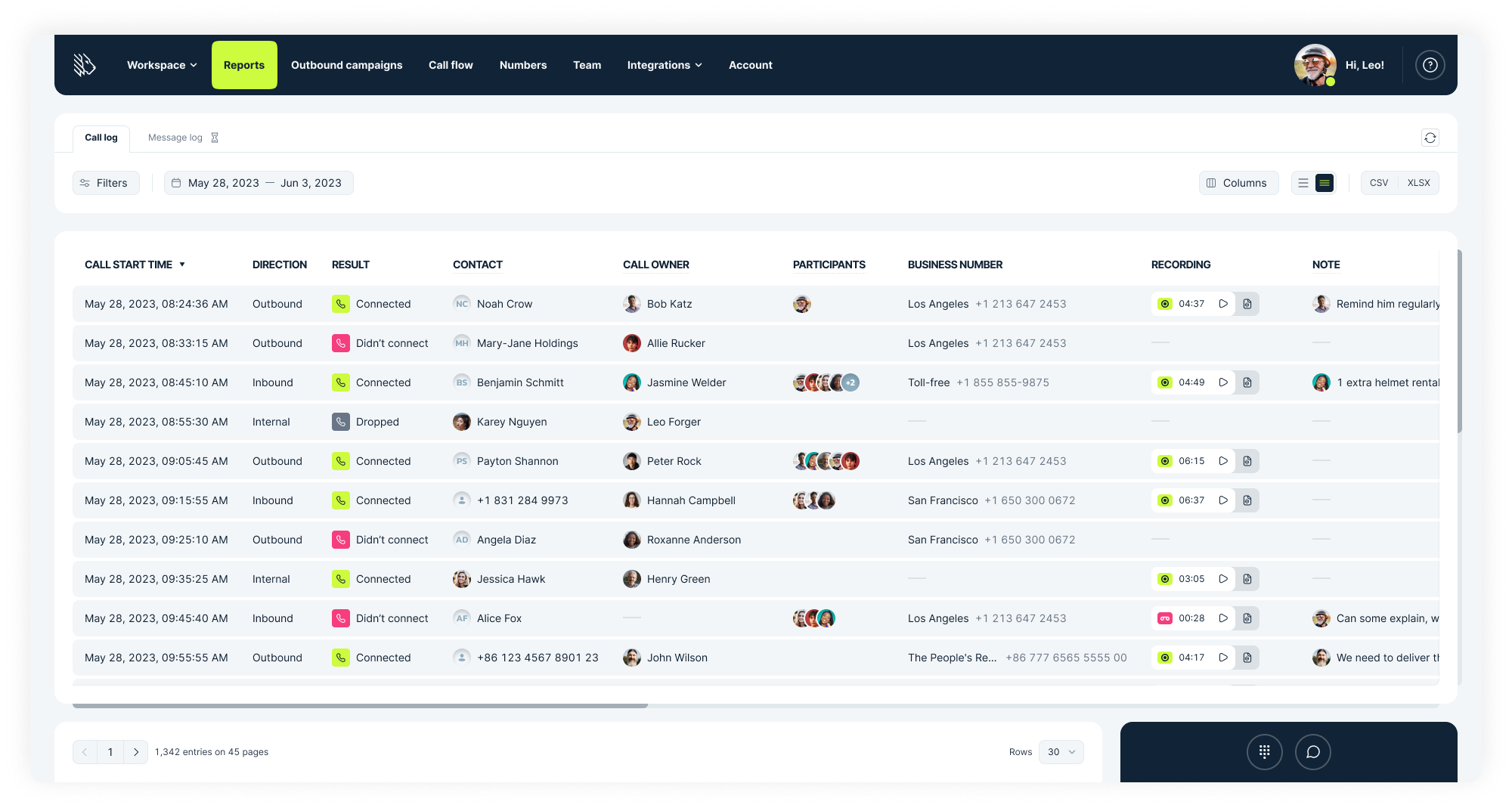
- Voicemail: Voicemail functionality ensures that when calls are unanswered, potential customers can still leave messages. This captures leads that might otherwise be lost and allows the sales team to gather information for well-prepared follow-up calls.
- Call routing: Effective call routing directs calls to the appropriate agent or department based on predefined criteria. This automated cold calling software feature ensures prospects speak with the most qualified person, streamlining the call handling process and improving the customer experience and success likelihood.
Best cold calling software
Before learning how to set up cold calling software, consider choosing suitable or, for some teams with a smaller budget, the cheapest cold calling software. This involves taking a careful look at factors such as ease of use, scalability, integration options, and customer support. Here are the top 10 cold calling software providers for you to choose from:
1. MightyCall
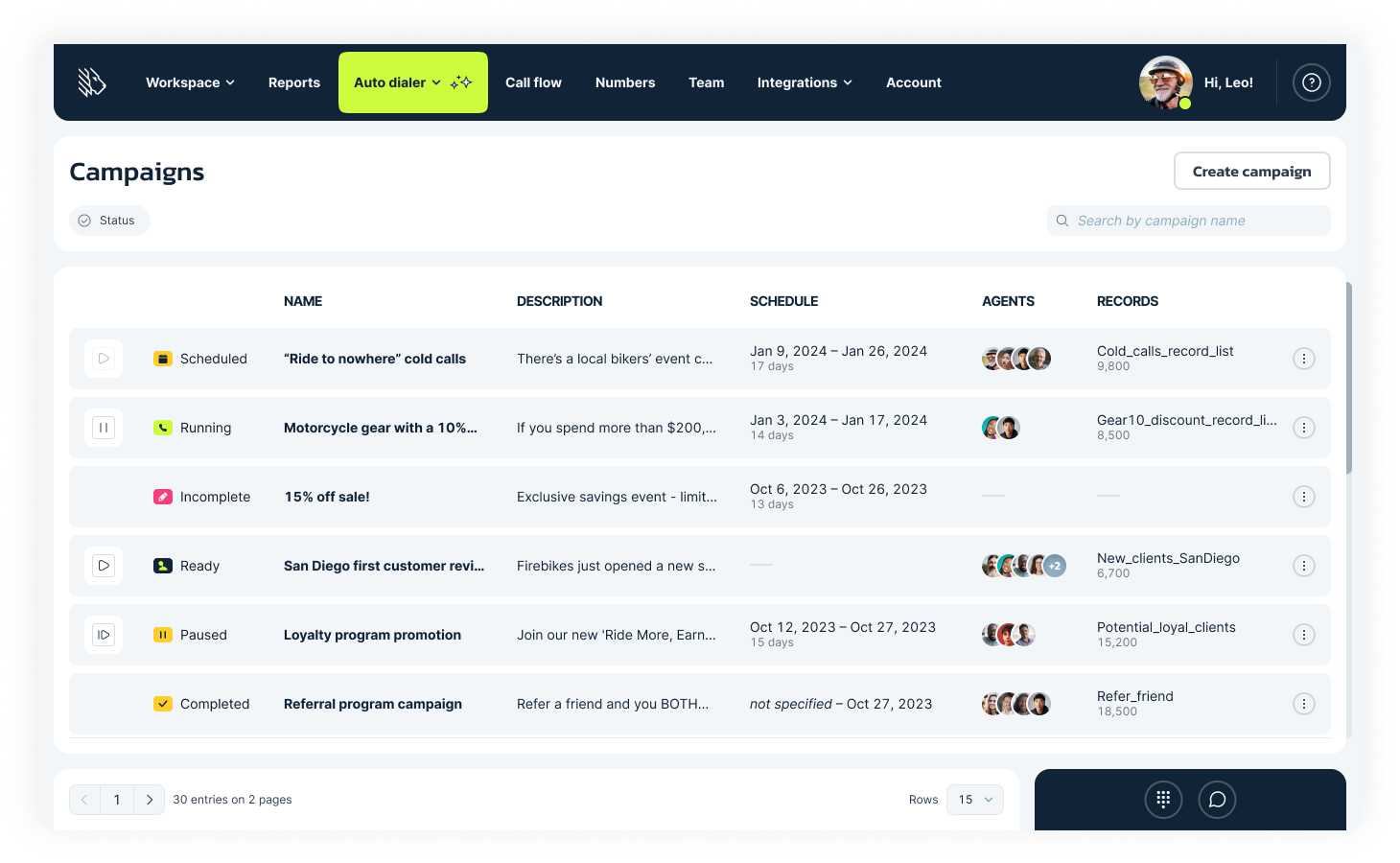
MightyCall offers an impressive suite of features designed for call management. Integrating with CRM systems and offering a user-friendly interface, it caters to a wide range of business needs. Its affordability and versatility make it attractive for various business sizes.
Main features:
- Customizable IVR
- Real-time analytics
- Live call monitoring
- CRM integration
Pros:
- Affordable
- Suitable for businesses of all sizes
- User-friendly
- Effective call management
- Versatile functions
Cons:
- Mostly caters to small and medium-sized call centers rather than large enterprises
- Uses CRM for full cold calling functionality
- Lacks built-in fax services
- May require you to use their demo to understand all the features
Best for:
Small to large call centers
2. Gong
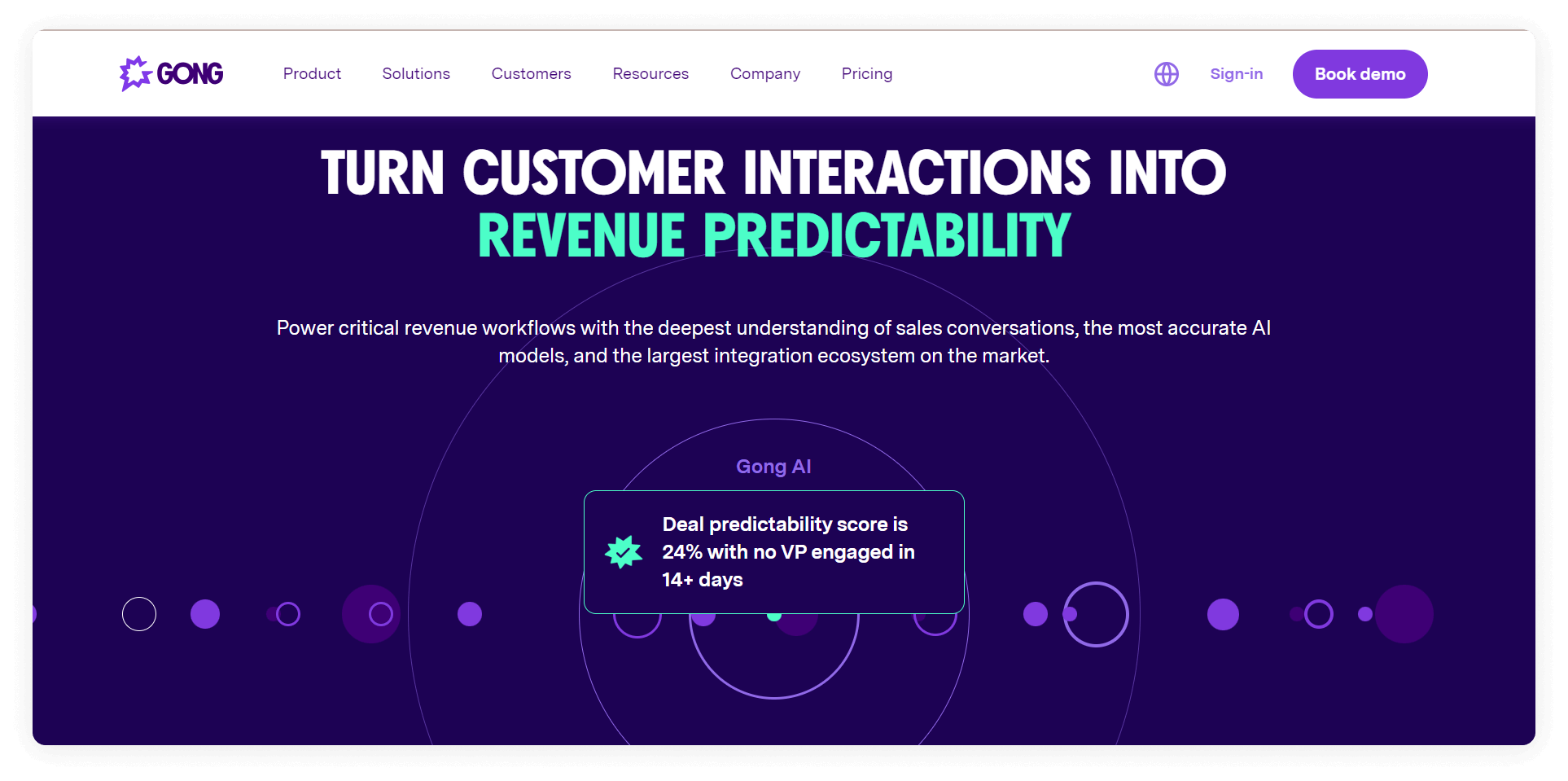
Gong excels in conversational intelligence, offering deep analysis of customer interactions. Integrating across customer touchpoints and employing AI for data analysis, Gong is a cold calling software for sales that offers valuable insights the business strategy improvement.
Main features:
- Conversational intelligence
- AI-driven analysis
- Cross-platform integration
- Detailed interaction analysis
- Customizable dashboards
Pros:
- Advanced AI
- Supports over 70 languages
- Insightful sales data
- Comprehensive interaction tracking
- Thorough data analysis
Cons:
- Higher pricing
- Complexity for smaller teams
- Base price plus subscription
- Advanced features only in higher plans
Best for:
Mid-sized to large call centers
3. VanillaSoft
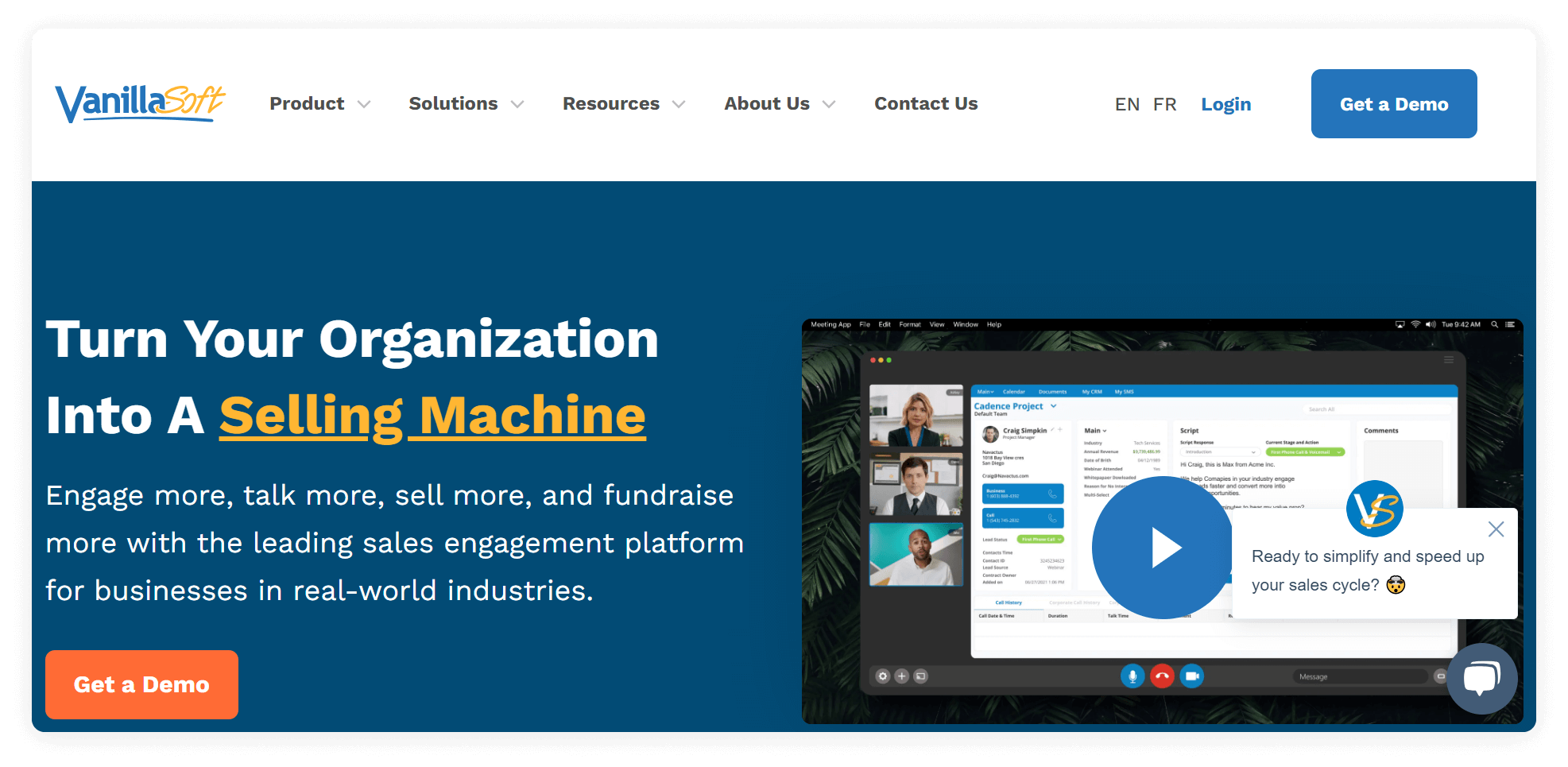
VanillaSoft caters to teams managing high lead volumes, offering lead scoring and intuitive dashboards. Designed for outbound calling efficiency, it provides features that amplify the effectiveness of sales campaigns.
Main features:
- Custom lead scoring
- Progressive and preview dialing
- Specific industry solutions
- Built-in CRM
- Intuitive dashboards
Pros:
- Manages large lead volumes
- Intuitive interface
- Auto-dialing
- Combined CRM and calling
- Industry customization
Cons:
- Higher initial price
- Basic platform focused on lead management
- Add-ons for advanced features
- The SMS tool only goes back 7 days
Best for:
Mid-sized to large call centers
4. Aircall
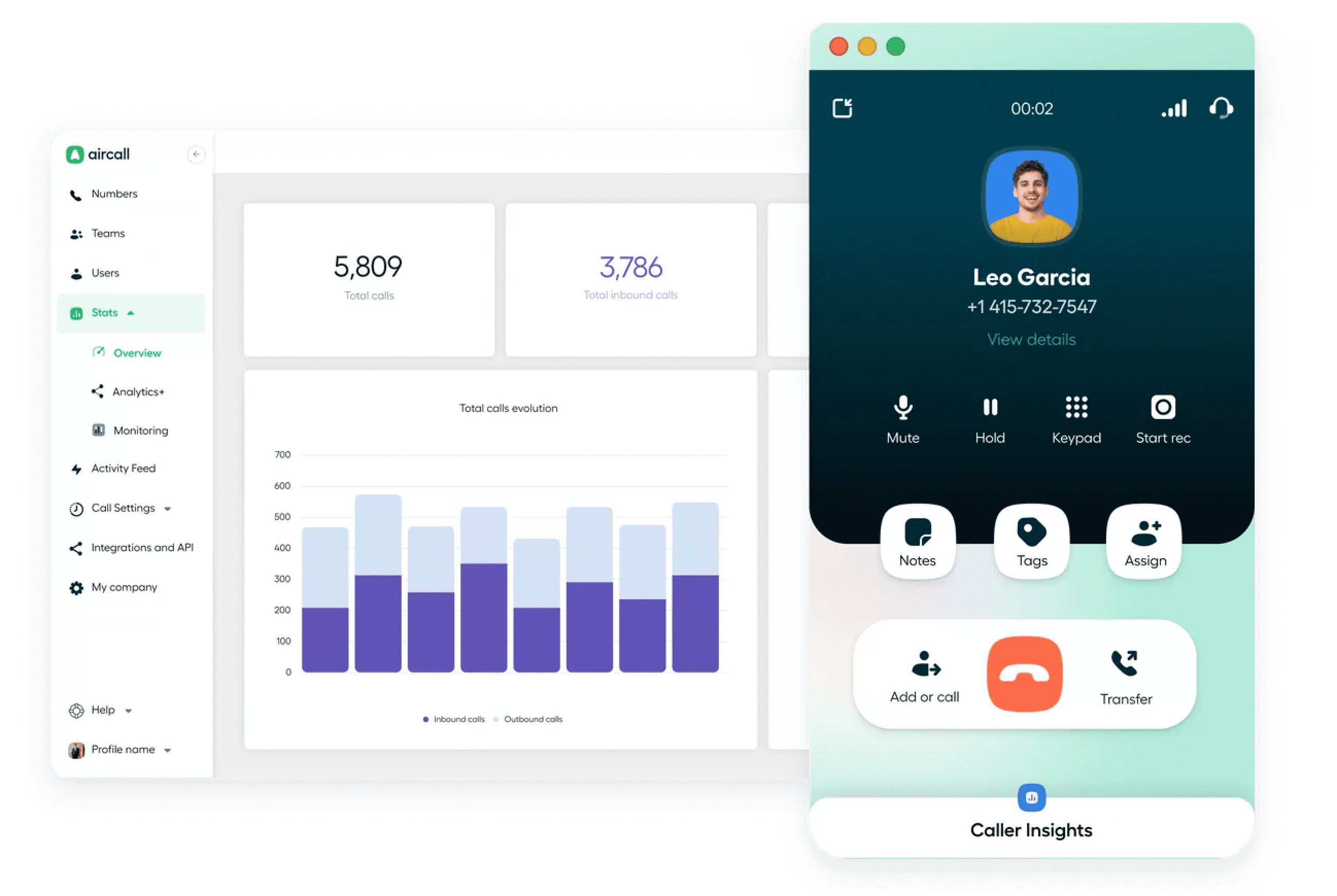
Aircall is a сloud-based phone system that integrates well with CRM systems, automating workflows and logging calls efficiently. It aims to increase the productivity of sales teams through a more efficient and data-focused call process.
Main features:
- Automated workflows
- Power dialing
- Sales analytics
- CRM integration
- Unlimited US and Canada calls
Pros:
- Efficient call handling
- Simplifies logging
- Thorough analytics
- Suitable for small to medium teams
- Unlimited calling in select areas
Cons:
- Minimum user requirement
- No built-in CRM features
- No support on the weekends
- Limited international call options
Best for:
Small to mid-sized call centers
5. RingCentral
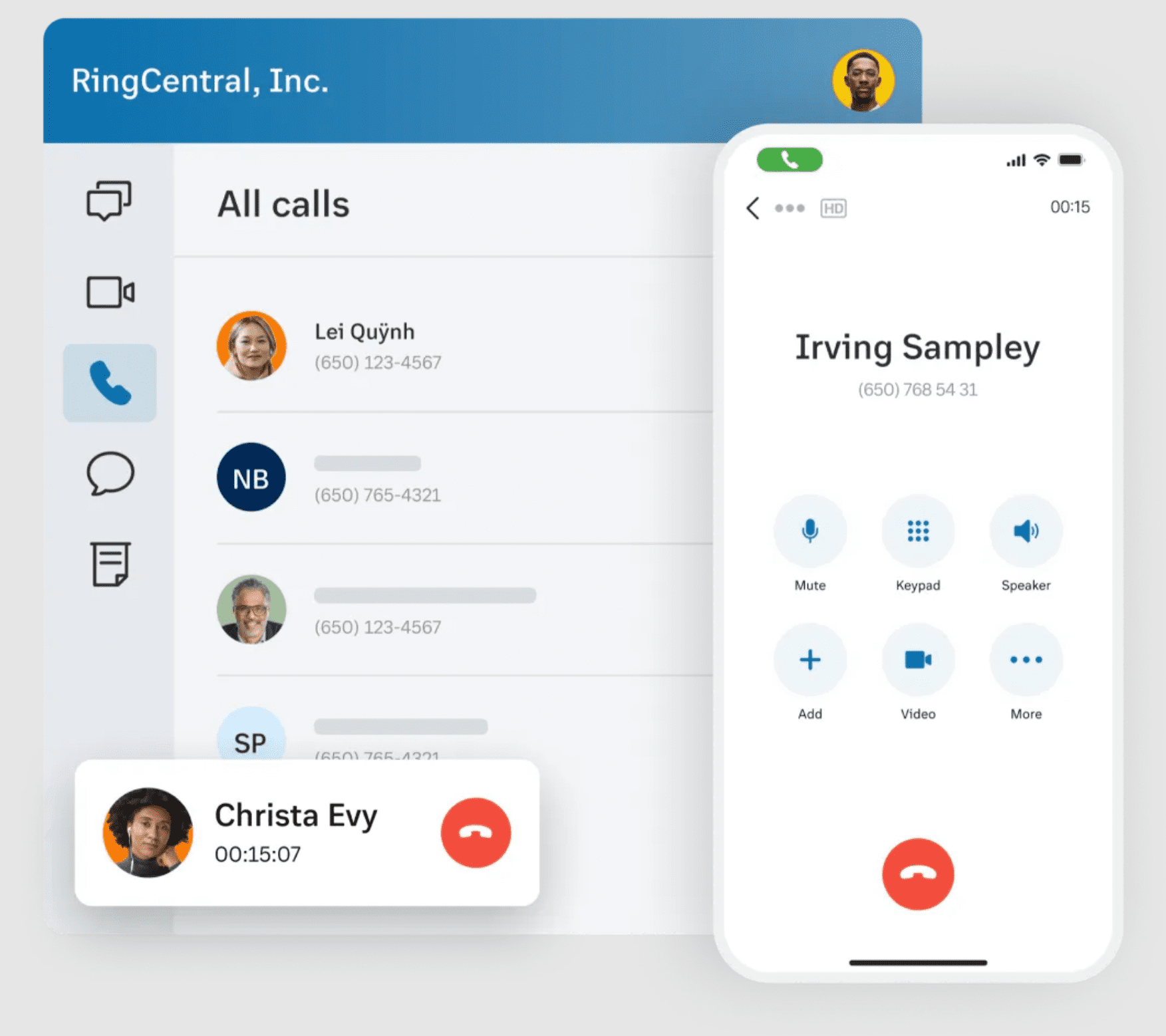
RingCentral, a key player in communications software, offers Engage Voice for outbound sales and service, providing customizable call options and scripts for different campaign needs.
Main features:
- Multiple call types
- Custom call scripts
- Broad integration options
- Campaign customization
- Reliable cloud infrastructure
Pros:
- Established brand in communications
- Customization for varied lead types
- Extensive features
- Global operation support
- Strong API for integration
Cons:
- Slow customer support response times
- No support for Linux
- Better for larger businesses
- Limited IVR options outside of the Unlimited plan
Best for:
Large enterprises
6. Klenty
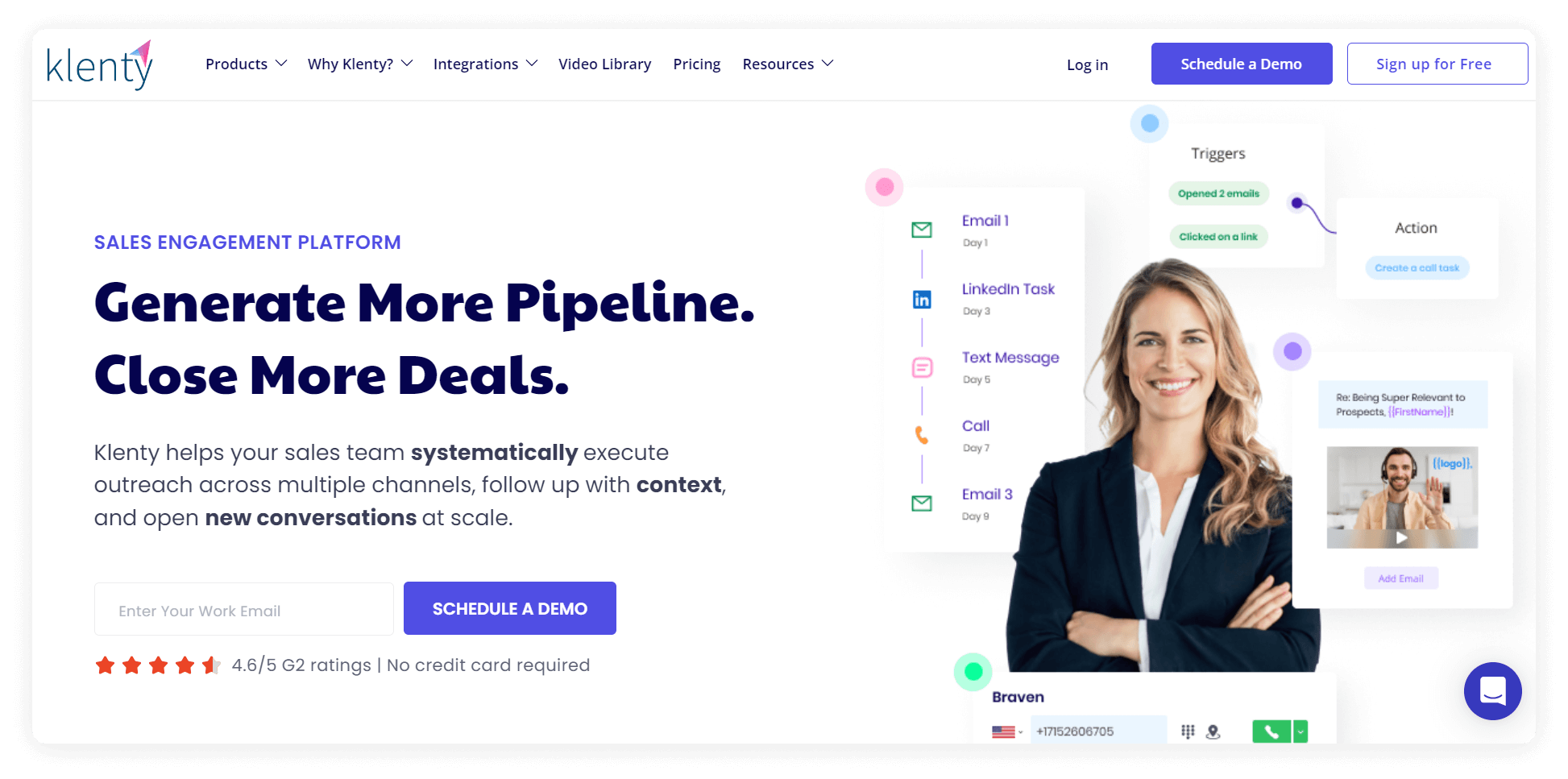
Klenty stands out for its multi-mode calling experience, offering a cold calling system with click-to-call dialing. It speeds up call activities, allowing for more prospect contacts per day, and integrates call recording and automatic note-taking.
Main features:
- Parallel dialer
- Power dialer
- Click-to-call
- AI-based note-taking
- Call recording
Pros:
- Accelerates call activities
- Multiple dialing modes
- Integrates with CRM
- Automates note-taking
- Personalized voicemail drop
Cons:
- Learning curve for new users
- Higher pricing for advanced plans
- Overcomplicated design according to its users
- Requires integration for full functionality
Best for:
Small to mid-sized enterprises
7. Myphoner
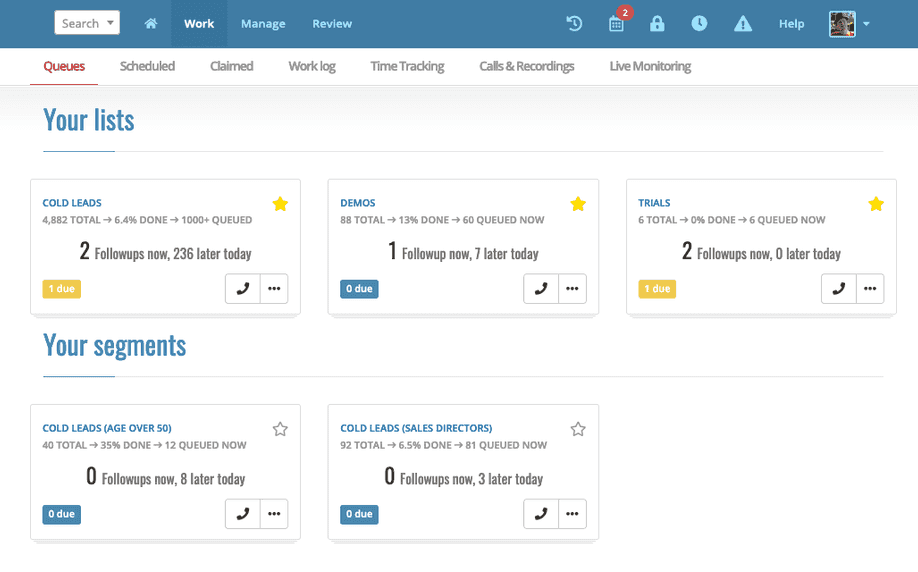
Myphoner assists sales professionals in tracking and organizing leads, creating intelligent queues for optimal contact timing. It also deduplicates contacts to prevent spamming and integrates with CRM for up-to-date customer profiles.
Main features:
- Lead tracking
- Intelligent queues
- Contact deduplication
- CRM integration
- Advanced call analytics
Pros:
- Organizes leads
- Avoids contact duplication
- Integrates with CRM
- Affordable pricing
- Provides thorough call analytics
Cons:
- Limited features in basic plan
- Advanced features at higher cost
- Lacks inbound call handling in starter plan
- May require CRM for full functionality
Best for:
Small enterprises
8. Toky
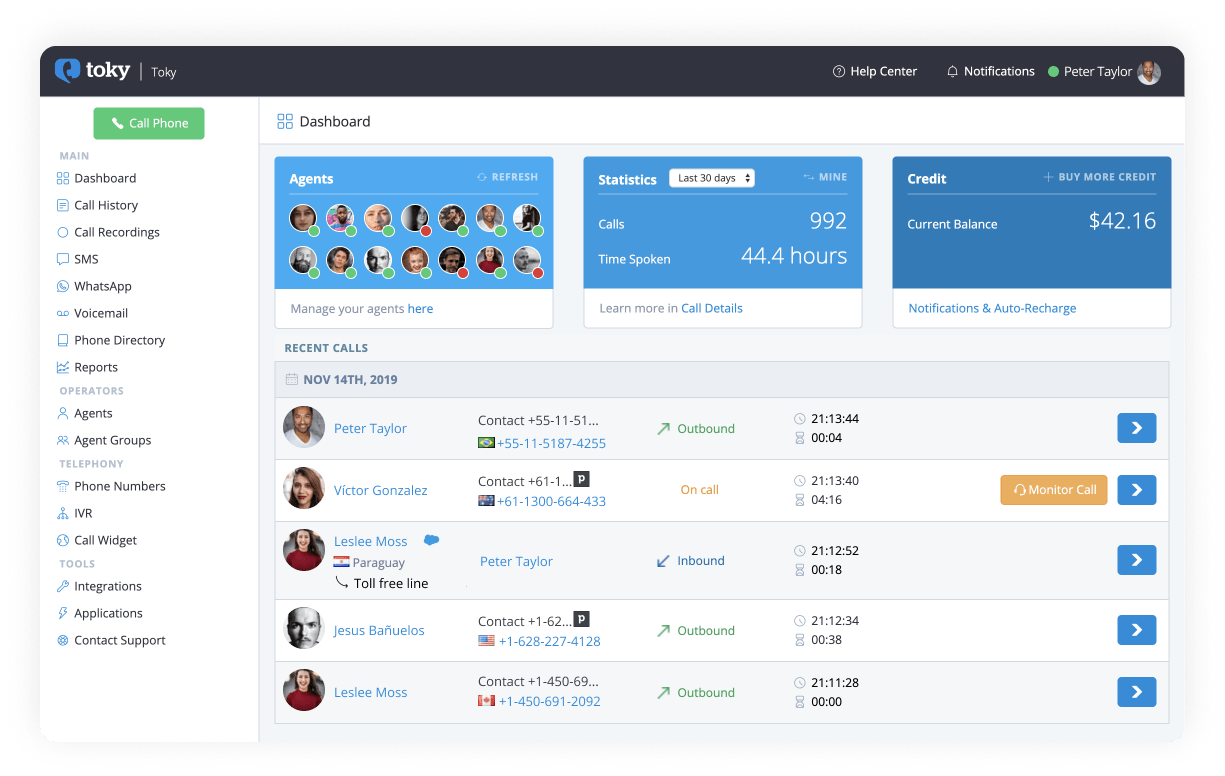
Toky is a cloud-based software for cold calling known for its easy integration, making it a perfect choice for small teams or solo agents. It offers features such as call-forwarding and a power dialer, making the calling process more straightforward. Grouping agents in a smart way improves team productivity.
Main features:
- Call-forwarding
- Power dialer
- Smart agent grouping
- Integration options
- Real-time call monitoring
Pros:
- Works with popular business tools
- Ideal for small teams
- Simplified call handling
- Accessible on different devices
- Smart agent grouping for call efficiency
Cons:
- Add-ons are priced separately
- Limited advanced features in the starter plan
- If the outbound call is unanswered, it does not get recorded
- Basic plan missing some key features
Best for:
Small enterprises
9. HubSpot Sales Hub
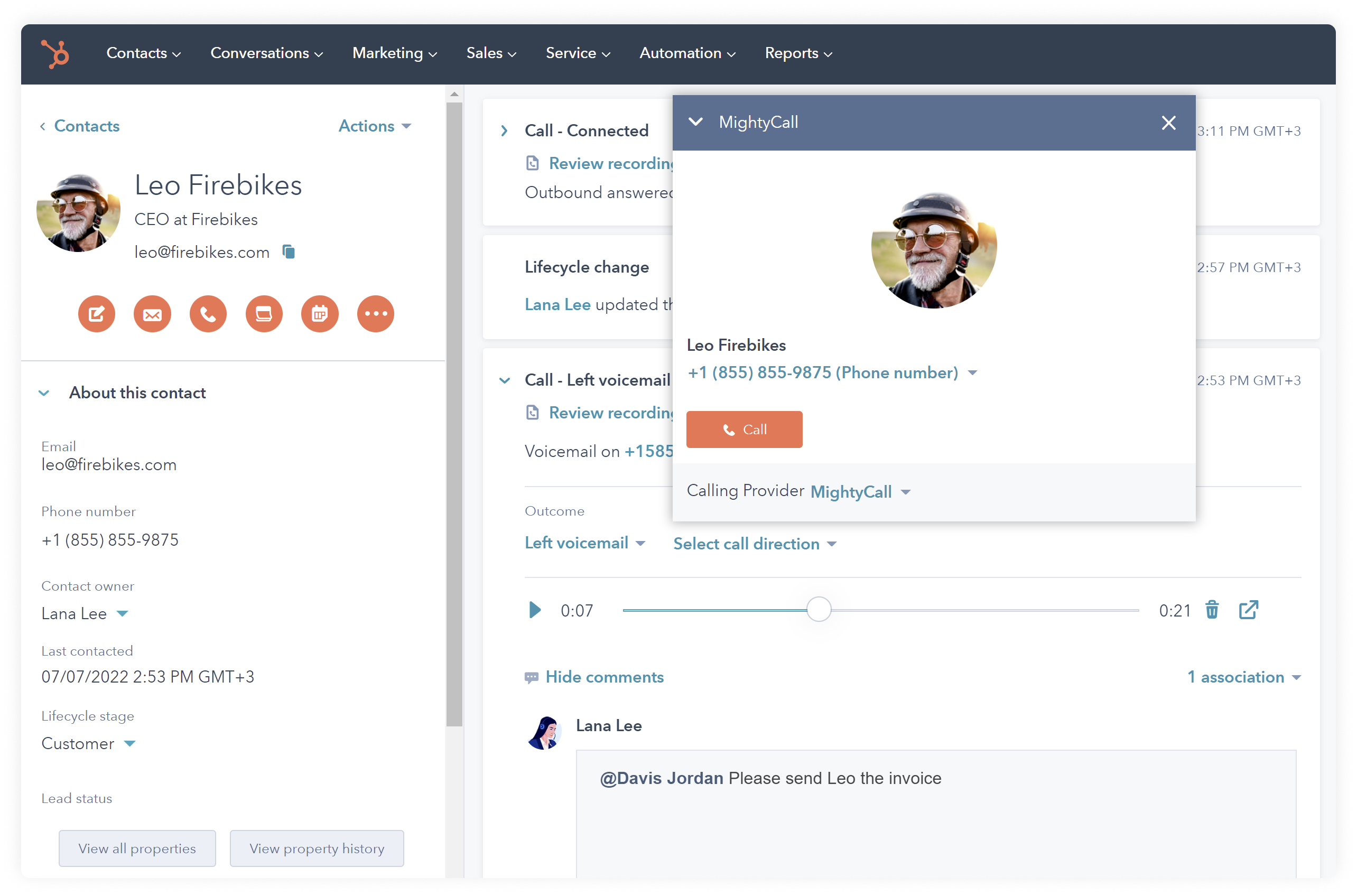
HubSpot Sales Hub provides a unified solution for sales teams, integrating with HubSpot’s CRM. It’s known for its desktop dialing and automatic CRM call logging, making the sales process more straightforward and improving lead management.
Main features:
- Desktop dialing
- Automatic CRM call logging
- Conversational intelligence
- Multi-channel prospecting
- Sales outreach integration
Pros:
- Works with HubSpot CRM
- Simplifies lead tracking
- Multi-channel outreach
- Advanced conversational intelligence
- Wide range of functionality for sales teams
Cons:
- No voicemail drop
- Higher price for advanced packages
- Limited customization in lower-tier plans, no dark mode
- Needs HubSpot CRM for full integration
Best for:
Mid-sized to large enterprises
10. Close
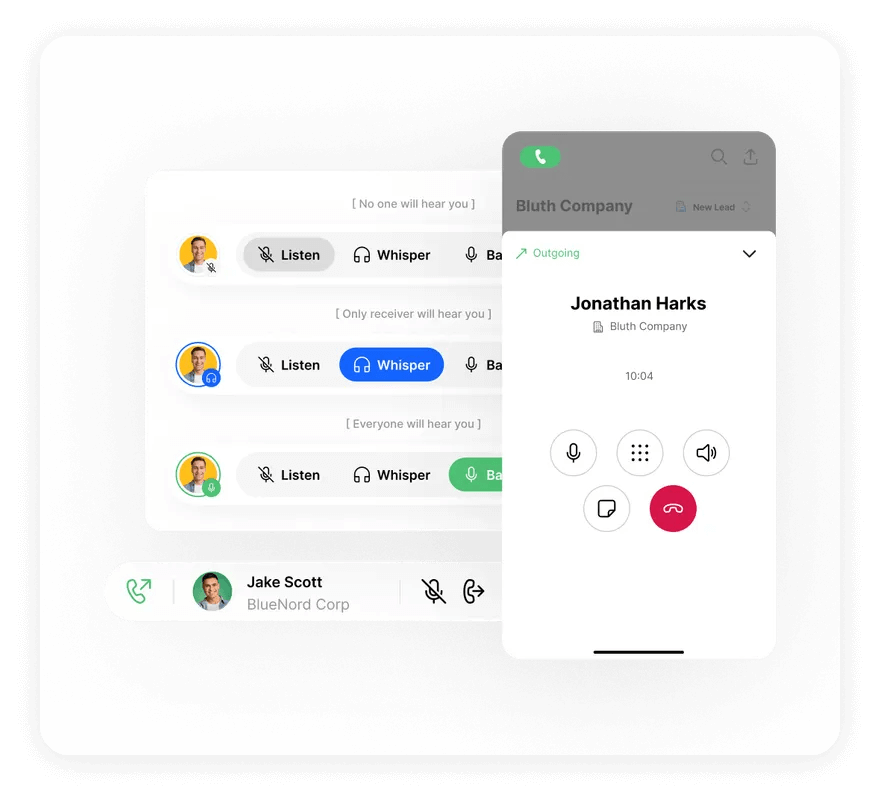
Close provides a CRM solution for cold calling and multi-channel prospecting. With built-in global calling features and text messaging, it’s a complete solution for sales teams, making their prospecting more effective.
Main features:
- Built-in global calling
- Text messaging
- Call forwarding
- CRM integration
- Multi-channel prospecting
Pros:
- Complete CRM solution
- Global outreach support
- Text messaging for better communication
- User-friendly interface
- Wide range of prospecting tools
Cons:
- Higher price for premium plans
- Limited scalability
- May need extra tools for full use
- A few interface complaints from users
Best for:
Mid-sized to large enterprises
Implementing cold calling app: an example
Before implementation
ABC Tech, a mid-sized software company, uses traditional cold calling methods. Their sales team manually dials potential clients from a long list, with no lead prioritization. Call tracking involves spreadsheets, leading to errors and missed follow-up opportunities. High call volumes cause team burnout and low morale. Without caller ID, many calls go unanswered, as potential clients often do not recognize the incoming number.
Main steps for the software implementation
To effectively integrate a cold calling app into your sales strategy, consider these steps:
- Evaluate: Assess the specific needs and goals of your sales team.
- Choose: Select the best cold calling software that aligns with your business objectives and sales processes.
- Educate: Provide training to ensure your team can use all tools and features effectively.
- Combine: Merge the software into your existing sales workflow for a unified approach.
- Review: Regularly assess the software’s impact on sales outcomes and adjust as needed.
After implementing cold calling software for IT sales
- Automated dialing and lead prioritization: ABC Tech’s sales team now uses the automated dialing feature, which prioritizes leads based on their potential for conversion. This results in more focused calling efforts on high-value prospects.
- Improved caller recognition with caller ID: The software’s caller ID feature shows ABC Tech’s name on clients’ screens, increasing the rate of answered calls as recipients recognize the business.
- Effective lead management with call logs: The software automatically records all call details, eliminating the need for manual entry. By dialing with a software for cold calling, the records get automatically stored. This provides the team with a reliable history of interactions, ensuring comprehensive follow-up tracking.
- SMS integration for continued engagement: Following initial calls, the team uses SMS integration to send additional messages, maintaining engagement and providing further information to potential clients.
- Organized call handling with call routing: Calls are now directed to the most suitable team member, ensuring prospects communicate with the right person initially. This has improved interaction quality and the likelihood of successful conversions.
- Improved morale and productivity: The organized approach reduces the workload on sales representatives, preventing burnout and improving morale. The team now handles calls more productively, leading to improved performance and increased job satisfaction.
With the adoption of cold call software, ABC Tech transformed its sales approach from a manual, error-prone process to a more strategic and organized operation, leading to increased lead conversion rates, better customer engagement, and enhanced team morale.
Tips for using a software for cold calling:
Use predictive analysis and future trends
Use the data from your sales calling software in predictive analysis. Analyze past call data to forecast optimal call times, the probability of lead conversion, and potential customer lifetime value. These predictive features have the potential to redefine the success of cold calling strategies.
Navigate legal and ethical considerations in cold calling
Navigating legal and ethical considerations in cold calling, especially regarding privacy and unsolicited calls, is crucial. Cold or sales call software includes features that help businesses comply with regulations like GDPR or the Telephone Consumer Protection Act (TCPA) in the United States. These features comprise:
- Automatic management of Do Not Call (DNC) lists.
- Time-zone-sensitive calling to avoid unsociable hours.
You can also consider the following:
- Transparent Caller Identification: Ensuring that the caller’s identity and purpose of the call are clearly stated at the beginning of each conversation to maintain transparency.
- Sensitive to Customer Feedback: Being responsive to the tone and feedback of the customer during the call and ready to adjust the approach or terminate the call if it’s causing discomfort. Listening to your customer should be one of the best cold calling tools for the success of your company.
- Respect for Opt-out Requests: Honoring any request from a prospect to opt out of future calls and updating the database accordingly to avoid any future inconvenience.
- Data Privacy Compliance: Adhering strictly to data protection laws by securely handling and storing customer data and only using it for the intended purpose of the call.
- Regular Training on Ethical Practices: Providing ongoing training for sales staff on ethical calling practices and changes in regulations to ensure compliance and maintain high standards of professionalism. It especially concerns teams who will be using software for cold calling.
Foster a positive customer experience via cold calling
Positive customer experience is a significant advantage of cold calling. Sales call software contributes to this by:
- Ensuring prompt follow-up calls, demonstrating the company’s commitment to the prospect’s interest.
- Allowing immediate resolution of customer queries or concerns, improving customer satisfaction and brand perception.
Train your team to become pros at cold calling software
Effective use of any software is contingent on proper training and development. Sales teams require training in both the technical aspects of the software, especially if using CRM for cold calling, and in communication skills that utilize the software’s functions. This training encompasses:
- Role-playing sessions to simulate various calling scenarios.
- Workshops focused on integrating call insights into broader sales strategies.
Addressing common sales challenges with a cold calling software
The right cold calling software for sales addresses most communication challenges faced by call center teams:
- Reducing time on unproductive calls: Automates dialing and repetitive tasks, allowing sales representatives more time for meaningful conversations.
- Improving lead management: Integrates with CRM tools to track every interaction with a prospect, enhancing the lead nurturing process.
- Adaptable features for diverse sales teams: its features make it a perfect software to record daily contacts for cold calling and cater to different sales environments, from small businesses to large enterprises.
Should you invest in cold calling systems?
Cold calling software is not just an automation tool for sales calls; it’s a solution that empowers sales teams to operate with greater strategic insight and effectiveness. Embracing this technology enables businesses to improve their immediate sales results and establish a foundation for sustained growth and success in the competitive sales and marketing world.






























